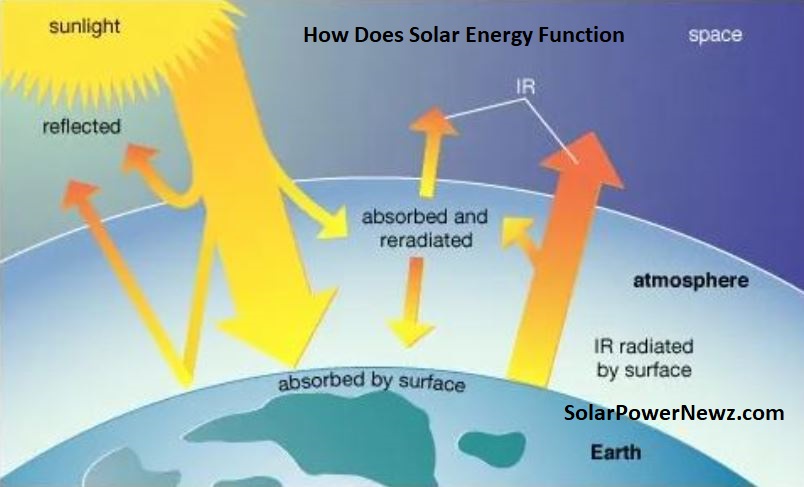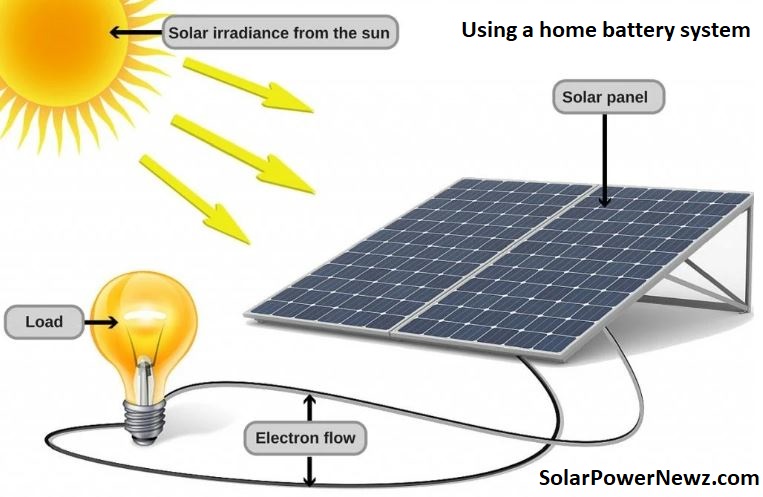How Does Solar Energy Function
In this article we will discuss about How Does Solar Energy Function. Solar energy is an excellent and tested solution to lower your energy costs. however, have you ever thought how it functions? In this post, we’ll focus at:
- How solar energy generates electricity for your home, business, etc.
- Why using solar energy makes sense; as well as
- How to store generate by the solar energy for future use
Solar panels are used to capture solar energy; they do this by converting solar energy into electrical power that can be utilised to run buildings and residences. When sunlight hits the photovoltaic cells that make up the solar panels, the process starts. Semiconductor components found in these cells, like silicon, absorb solar energy and transform it into electrical energy. After that, the electricity is delivered to an inverter, which transforms the direct current (DC) electricity generated by the solar panels into alternating current (AC), the kind of electricity typically utilised in homes and businesses. The AC power is next transmitted to the electrical grid or put into batteries for later use.
Important points.
- Electricity is produced using solar panels, which harness solar energy.
- Solar panels absorb sunlight using photovoltaic cells.
- The cells convert solar energy into electricity using semiconductor materials like silicon.
- The electricity produced by the solar panels is direct current, which inverters change to alternating current.
- Alternating current power is either delivered to the electrical grid or stored in batteries for later use.
Table of Contents
How Solar Power Works
When sunlight shines on solar cells (even in overcast weather), electrons are released, leaving a hole in which another electron can fall and interact with it to generate energy. The movement of the electron is referred to as electricity. This is known as the Photovoltaic Effect. PV is an abbreviation for photovoltaic.

The solar inverter converts the direct current (DC) electricity generated by the solar panels into 240V alternating current (AC), which can then be used by the property/household, exported to the grid, or stored in a battery storage system.
The quantity of sunshine that strikes the earth’s surface in an hour and a half is enough to power the entire planet for a year. Solar technologies use photovoltaic (PV) panels or mirrors to concentrate solar radiation to convert sunlight into electrical energy. This energy can be converted into electricity or stored in batteries or thermal storage.
- The sun shines on the solar panels, which generate direct current electricity.
- The direct current electricity is fed into a solar inverter, which converts it to 240V 50Hz alternating current electricity.
- Your home’s appliances are powered by 240V AC electricity.
- Surplus energy is fed back into the grid.

Why does solar energy make logical Sense
There are lots of reasons why solar energy makes sense, the most impact of which are mentioned below:-
- There is no pollution. Because solar energy is a renewable source of energy, it does not pollute the environment.
- Independent Power Generation The electricity you get from your government is frequently imported from other countries.
- Availability Solar energy is a renewable energy source that is available most of the year.
- There is no need for maintenance…
- A long-term investment…
Solar Energy vs Solar Power
Power and energy are two distinct things. Most professionals in the field misunderstand these two crucial words. Electrical current is produced by electrons in a wire, and the speed of the electrons reveals the strength of the current. Power is hence the pace at which electricity is produced or utilised. Kilowatts and joules per second are two units of measurement for power (kW). A solar system’s size is determined by its maximum kilowatt output.
Watts = Joules per second = Energy consumption rate
A kilowatt hour (kWh) is an energy unit, not a power unit. The amount of power stored, generated, or used over a period of time is referred to as energy. For example, today my solar PV system generated 12 kWh of electricity, my battery stores 10 kWh of energy, and my heater used 3 kWh of energy.
Using a home battery system, you can continue to store solar power for later use.
Because it is generated when it is not needed, such as in the middle of the day, a large proportion of the energy produced by solar panels is sent back to the grid in most Australian homes.

The addition of home battery storage to a solar power system protects your investment by allowing you to store unused energy and use it later rather than sending it back to the grid. You can use your stored energy with a battery in the following ways:
At night;
on days with little sunlight;
when utility rates are higher;
and during blackouts;
Another option for storing excess solar power is to use a solar-smart electric water heater like the Solahart Power Store, a product designed and built in Australia that directly convert excess solar power into hot water.
How Does Solar Energy Function advantage & disadvantages
Solar energy works by transforming the sun’s energy into useful electricity for residences and commercial buildings.
Advantages
- Solar energy is a renewable energy source since it is continuously replenished and will never run out.
- Low upkeep: Solar panels are extremely low maintenance and have a long lifespan.
- Cost-effective: Solar panel technology has become a more affordable choice for many individuals as a result of recent dramatic drops in price.
- Lowers electricity costs: By producing your own electricity, you can lessen or do away with the need for the grid and your electricity costs.
- Environmentally friendly: Solar energy is an option that is free of emissions and is a clean source of energy.
- Versatility: Solar panels can be utilised in isolated locations where electricity from the grid is unavailable for a range of applications, including powering homes and businesses.
- minimal noise pollution
- can be applied to desalination and water heating
- Suitable for usage in transportation
- decreases reliance on fossil fuels
disadvantages
- Solar panel installation and purchase might be expensive initially, though this cost is gradually going down.
- Solar panels are weather-dependent, and cloud cover and other meteorological factors may have an impact on their efficiency.
- Limited energy storage: It can be difficult, expensive, and require additional equipment to store the energy produced by solar panels.
- Solar panels are not appropriate for all settings and may not be able to provide enough electricity in regions with little sunlight.
- Not suited to all climes, it performs poorly in cold and gloomy conditions.
- Large-scale solar generating facilities need a lot of land.
- Can lead to visual pollution; insufficient for protecting natural ecosystems
- may present a risk to safety during setup and maintenance.
- Solar panels may not appeal to everyone due to their appearance.